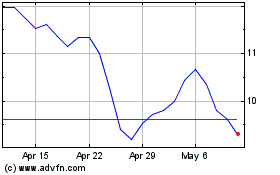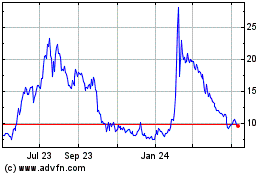Adverum Biotechnologies, Inc. (Nasdaq: ADVM), a clinical-stage gene
therapy company targeting unmet medical needs in ocular and rare
diseases, today announced that the first patient was randomized in
the INFINITY clinical trial to evaluate ADVM-022 for the treatment
of diabetic macular edema (DME). Diabetes impacts over 30 million
people in the United States and over 400 million people globally
and is increasing in prevalence. Approximately 5% of adults with
diabetes are impacted by DME, a vision-threatening complication of
diabetic retinopathy.
Arshad M. Khanani, M.D., M.A., principal INFINITY trial
investigator, and director of clinical research, Sierra Eye
Associates, where the first patient was enrolled in INFINITY said,
“The current gold-standard therapy for DME is burdensome and often
not possible clinical practice around the world, as patients
require frequent, long-term anti-VEGF intravitreal injections.
Based on the transformative data presented to date in the ongoing
OPTIC trial for wet AMD, I believe that, with a single intravitreal
injection, ADVM-022 has the potential to change the treatment
paradigm and improve outcomes for patients with DME.”
“We are excited to have randomized the first patient in
INFINITY,” said Aaron Osborne, MBBS, chief medical officer of
Adverum Biotechnologies. “With continued growing momentum in our
OPTIC and INFINITY trials, our goal is to bring forward our novel
gene therapy, ADVM-022 as a one-time treatment option for patients
living with wet AMD and DME, two of the leading causes of vision
loss and blindness around the world. We are grateful to the
participants and investigators and expect to present data from
INFINITY in the second half of 2021.”
About the INFINITY Phase 2 Trial of ADVM-022 in
DR/DMEINFINITY is a Phase 2, multi-center, randomized,
double-masked, active comparator-controlled trial designed to
assess a single intravitreal (IVT) injection of ADVM-022 in
patients with diabetic macular edema (DME), the most common cause
of vision loss in patients with diabetic retinopathy (DR).
The INFINITY trial will enroll approximately 33 patients and is
designed to demonstrate superior control of disease activity
following a single IVT injection of ADVM-022 compared to a single
aflibercept injection, as measured by time to worsening of DME
disease activities. Additional objectives include assessments of
treatment burden, visual acuity, retinal anatomy, and safety
outcomes.
Across the United States, leading retinal clinical trial sites
will participate in the INFINITY trial. For additional information,
please visit www.clinicaltrials.gov using Identified NCT#04418427
or www.INFINITYclinicaltrial.com.
About Diabetic Retinopathy (DR) and Diabetic Macular
Edema (DME)In the United States, over 30 million people
are impacted by diabetes, and the prevalence has increased
significantly to 12% of adults, according to the Centers for
Disease Control (CDC)1. On a global basis, over 400 million people
have diabetes, a significant increase from approximately 100
million in 1980, with prevalence rising to over 8% of adults,
according to the World Health Organization (WHO)2.
Diabetic retinopathy (DR) affects approximately one in three
adults with diabetes and can put patients at risk of vision loss.
DR can be diagnosed at different severity levels, and is the most
common cause of blindness in working-age adults in the U.S.
Diabetic macular edema (DME) is a vision-threatening
complication of DR that can occur at any severity stage of DR. DME
is characterized by retinal thickening in the area of the macula,
and the risk of DME increases with the worsening of the DR severity
score (DRSS). DME affects approximately 5% of people with diabetes
and is the leading cause of vision loss in patients with DR.
The current standard-of-care therapy for DME is anti-VEGF
intravitreal injections. These are effective but typically require
frequent and long-term injections for patients to maintain good
vision. Compliance with these regimens can be difficult for
patients, leading to undertreatment and vision loss. Real-world
outcomes in DME with anti-VEGF therapy are meaningfully worse than
in clinical trials.
About ADVM-022 Gene TherapyADVM-022 utilizes a
proprietary vector capsid, AAV.7m8, carrying an aflibercept coding
sequence under the control of a proprietary expression cassette.
ADVM-022 is administered as a one-time intravitreal injection
(IVT), designed to deliver long-term efficacy and reduce the burden
of frequent anti-VEGF injections, optimize patient compliance and
improve vision outcomes for patients with wet age-related macular
degeneration (wet AMD) and diabetic macular edema (DME).
In recognition of the need for new treatment options for wet
AMD, the U.S. Food and Drug Administration granted Fast Track
designation for ADVM-022 for the treatment of wet AMD.Adverum is
currently evaluating ADVM-022 in the OPTIC Phase 1 clinical trial
in patients with wet AMD and the INFINITY Phase 2 trial in patients
with DME.
About Adverum BiotechnologiesAdverum
Biotechnologies (Nasdaq: ADVM) is a clinical-stage gene therapy
company targeting unmet medical needs in serious ocular and rare
diseases. Adverum is advancing the clinical development of its
novel gene therapy candidate, ADVM-022, as a one-time, intravitreal
injection for the treatment of patients with wet age-related
macular degeneration and diabetic macular edema. For more
information, please visit www.adverum.com.
Forward-looking StatementsStatements contained
in this press release regarding the events or results that may
occur in the future are “forward-looking statements” within the
meaning of the Private Securities Litigation Reform Act of 1995.
Such statements include but are not limited to statements
regarding: the potential for ADVM-022 in treating patients with wet
AMD and DME; and Adverum’s expectations as to its plans to advance
ADVM-022 in DME by enrolling patients in the INFINITY trial, and as
to the expected enrollment numbers for the trial; and Adverum’s
expectations that it will present data from the INFINITY trial in
the second half of 2021. Actual results could differ
materially from those anticipated in such forward-looking
statements as a result of various risks and uncertainties, which
include risks inherent to, without limitation: Adverum’s novel
technology, which makes it difficult to predict the time and cost
of product candidate development and obtaining regulatory approval;
the results of early clinical trials not always being predictive of
future results; the potential for future complications or side
effects in connection with use of ADVM-022; obtaining regulatory
approval for gene therapy product candidates; enrolling patients in
clinical trials; reliance on third parties for conducting the OPTIC
and INFINITY trials and vector production; the effects of the
COVID-19 pandemic on the company’s operations and on the company’s
ongoing clinical trials; and ability to fund operations through
completion of the OPTIC and INFINITY trials and thereafter. Risks
and uncertainties facing Adverum are described more fully in
Adverum’s Form 10-Q filed with the SEC on May 28,
2020 under the heading “Risk Factors.” All forward-looking
statements contained in this press release speak only as of the
date on which they were made. Adverum undertakes no obligation to
update such statements to reflect events that occur or
circumstances that exist after the date on which they were
made.
Investor and Media Inquiries:
Investors:Myesha LacyAdverum Biotechnologies,
Inc.mlacy@adverum.com1-650-304-3892
Media:Cherilyn Cecchini, M.D.LifeSci
Communicationsccecchini@lifescicomms.com1-646-876-5196
1
https://www.cdc.gov/diabetes/pdfs/data/statistics/national-diabetes-statistics-report.pdf
2 https://www.who.int/news-room/fact-sheets/detail/diabetes
Adverum Biotechnologies (NASDAQ:ADVM)
Historical Stock Chart
From Mar 2024 to Apr 2024

Adverum Biotechnologies (NASDAQ:ADVM)
Historical Stock Chart
From Apr 2023 to Apr 2024
